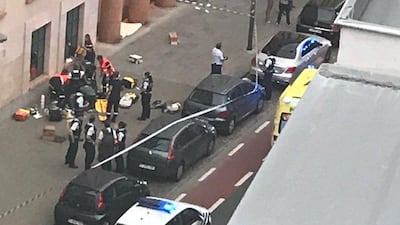European capitals remained on edge over the weekend after two attacks in London and Brussels on Friday night saw a terrorist shot dead, and three policemen and a soldier wounded across the two capitals.
Both incidents involved knifemen targeting security forces in highly visible locations; the London attack took place outside Buckingham Palace, Queen Elizabeth II’s residence in London and a major tourist attraction, while the Belgium attack was near the Grand Palace in central Brussels.
Intelligence figures in Britain suggested that the attack was not against the royal family but instead against the unarmed police guarding the outside of the building.
Peter Kirkham, a former Metropolitan Police chief, told Sky News on Saturday that it appeared that the officers outside were seen as softer targets. While police within the footprint of the palace and its grounds are routinely armed, those outside are provided by the local force and are only armed with CS gas and tasers.
The 26-year-old attacker, who was initially detained on suspicion of causing grievous bodily harm and assaulting police, was later arrested under the Terrorism Act 2000.
Upon being challenged by officers, the man reached for what police described as a four-foot sword which was in the front passenger foot well. "The man, who repeatedly shouted Allahu akbar, was incapacitated with CS spray," police said on Saturday
The assailant deliberately drove his car towards a police vehicle in a restricted area outside the world-famous palace at around 8.35pm local time. Three unarmed officers were injured during the course of detaining the man, two of them requiring hospital treatment.
Originally from Luton, a city 50km north of London which has been described as a “hotbed” of extremism and been linked to previous terror attacks, the assailant was then taken to a London hospital for treatment of minor injuries before being taken to a central London police station for questioning.
"Officers from the Counter Terrorism command are now investigating and searched are being carried out in the Luton area today," Dean Haydon, the police head of counter-terrorism, said. "We believe the man was acting alone and we are not looking for other suspects at this stage."
The queen was at Balmoral, her residence in Scotland at the time.
A couple of hours before London was hit, Brussels was struck by a similar attack at 8pm local time. Belgian prosecutors said the attacker there had also yelled “Allahu akbar” during the assault before being shot by a soldier in the centre of city, which has been on high alert since the carnage inflicted on Brussels when the airport and the metro system were attacked, killing dozens.
One of the soldiers was "slightly" wounded in the attack which mayor Philippe Close said was perpetrated by a "lone individual".
The two incidents come as much of Europe is on high alert following a string of major attacks over the past two years — most of which have been claimed by, or blamed on, jihadists.
Last week, Spain was hit by twin vehicle attacks which left 15 dead, and another two people were killed in a stabbing spree in Finland, with the violence carried out by radicalised youngsters.
With much of Europe on a state of high alert over recent attacks, many of them ‘low-tech’ assaults using knives or vehicles as weapons, thousands of people were expected to take to the streets of Barcelona on Saturday evening in a defiant march under the slogan “No tinc por” -Catalan for “not afraid”.
Overnight, police raided the suspect's home in Bruges, northwest Belgium, with federal prosecutors opening an investigation into "attempted terrorist murder", a statement said. During the attack, the man rushed at several soldiers from behind and struck them with a knife, prompting one of them to open fire.
“The man was hit and died shortly afterwards in hospital from his wounds,” the prosecutors’ statement said. As well as the knife, police found a replica gun and two copies of the Koran on him.
The assailant was a Belgian national of Somali origin who was born in 1987, authorities confirmed. He arrived in the country in 2004 and was granted Belgian nationality in 2015.
Although not known for any terror-related activities, he had an assault and battery charge on his record from February, the statement said.
The attack happened on a boulevard near the Grand Place central square, one of the ‘sensitive’ areas of the capital where armed soldiers are on patrol because of the terror threat.
"I heard yelling and straight away two shots," said one witness,Yohan.
As he approached, he said he saw "a soldier bleeding from his hand and a man on the ground," who had a beard and was wearing a hood.
Soldiers have been deployed at railway stations and landmark buildings in the Belgian capital since the November 2015 attacks on Paris when investigators found the assailants had a clear link Brussels.
Their presence has been reinforced since suicide bombers struck Zavantem Airport and Maalbeek metro station in March 2016, killing 32 people and wounding hundreds more.
The carnage in Paris, which left 130 people dead and hundreds more wounded, was claimed by ISIL, which also said it was behind the bombings in Brussels.
In June, a man who tried to bomb a Brussels Central train station was shot dead by a soldier.
No one was injured but officials said the consequences could have been severe if the bomb, which was packed nails and gas canisters, had detonated.
In Britain, 35 people have been killed in three attacks in London and Manchester since March.
Two of those involved a vehicle ploughing into pedestrians.
The other attack was a bombing in May at the end of a pop concert by US star Ariana Grande in Manchester which killed 22 people, a third of them children.

